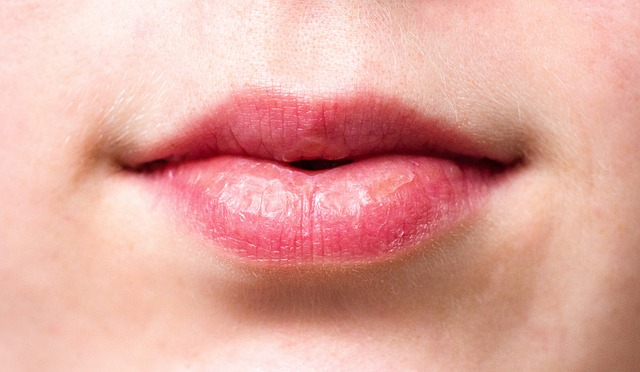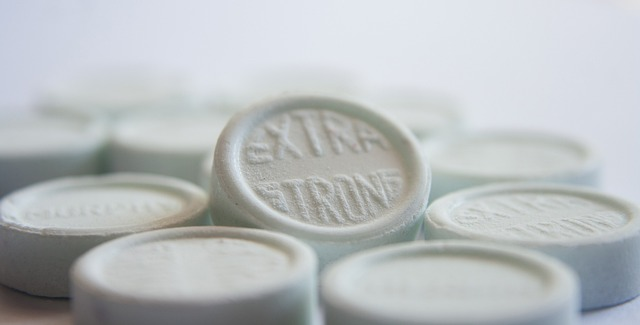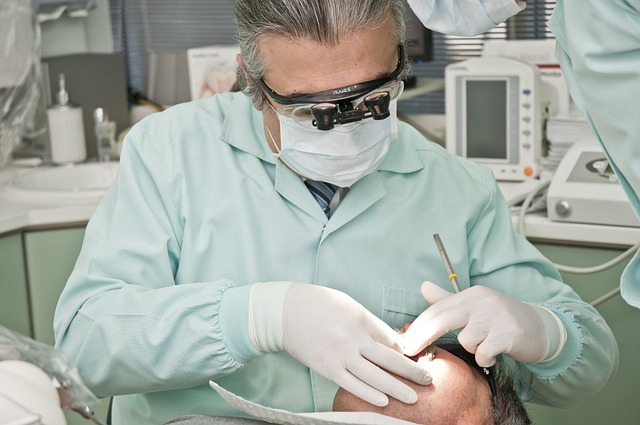Dr. Matthew Olesiak continues to make a significant impact in the medical field through his work at SANESolution and his dedication to evidence-based practices.
Menopause and Throat Health

- New Report Says Your Brain Could Be the Key to Reducing Phlegm Over 50
- Doctor's "Leave The Throat Phlegm Behind" Tutorial Goes Viral With People Over 50
- Can You Relieve Throat Phlegm and Coughing In 60 Seconds A Day? This Doctor Says Yes
- How To Banish Phlegm When 50+ (Do This Every Day)
Short Summary
- Understand the causes and concerns of throat and oral health issues in menopause.
- Utilize oral hygiene techniques, humidifiers, a well-balanced diet, and regular dental and doctor visits to mitigate these issues.
- Seek professional help if symptoms persist.

The Link Between Menopause and Throat Health
It may come as a surprise, but menopause can affect throat health.
While hot flashes, night sweats, mood swings, weight gain, vaginal dryness, insomnia, and fatigue are commonly associated with menopause, oral health and throat problems are often overlooked. However, women going through menopause often experience mouth and throat issues. Most of these problems are linked to changes in estrogen levels.
This Throat Health and Throat Cleaner blog post will explore the most prevalent throat and oral health conditions that menopausal women face and provide tips to help you steer clear of these problems. Continue learning more about your throat health needs and check out our Throat Disorders in Rheumatoid Arthritis: Types, Symptoms, Causes, and Treatments and Vocal Health: Top 14 Tips for a Healthy Voice and Throat guides next!
8 Throat and Oral Health Symptoms Associated with Menopause
Dry Mouth
A dry mouth is caused by insufficient saliva production, which can lead to a sticky or tingly sensation, as well as a burning feeling in your mouth. You might also experience halitosis (bad breath), cracked lips, or mouth sores. If left unaddressed, dry mouth can significantly impede the ability to chew, swallow, and speak.
It’s important to note that saliva plays a crucial role in maintaining oral hygiene. Specifically, it helps to rinse away any leftover food particles and harmful bacteria in the mouth. This, in turn, can help to prevent issues like cavities and periodontal disease from developing.
Menopausal women are more susceptible to dry mouth symptoms because of the dependent nature of salivary glands. Specifically, decreases in estrogen and progesterone in menopause can alter the secretion levels and consistency of saliva, leading to a dry mouth.
Remember, menopause is not the only potential cause of a dry mouth. It can also be caused by several other factors, including anxiety, smoking, dehydration, specific medications, and certain health conditions.

Burning Mouth Syndrome (BMS)
Burning mouth syndrome, also called burning tongue, is a condition where an individual experiences a burning sensation on the tongue, the roof of their mouth, or lips, not explained by lab tests. This can occur anywhere in the mouth or throat and often comes on suddenly, feeling akin to being burned by hot coffee.
The intensity of the burning sensation tends to increase throughout the day, with the mouth feeling fine in the morning but becoming increasingly painful as the day goes on.
Some sufferers may also experience a bitter or metallic taste in their mouth or a dry mouth despite normal salivation. In severe cases, chronic pain can lead to depression and anxiety.
Like dry mouth, various factors may play a role in BMS. Menopause-related BMS, however, is believed to be caused by declining estrogen levels.
Oral Thrush
Oral thrush is a fungal infection that occurs when Candida albicans overgrows in the body. This fungus is naturally present in the body and on the skin’s surface.
The condition is characterized by the appearance of white patches inside the mouth, primarily on the tongue and cheeks. This overgrowth can cause the tongue to become sore and inflamed and may lead to difficulty eating or swallowing food.
Fluctuating hormone levels, as occurs in menopause, can impact Candida albicans levels. potentially leading to an overgrowth.
See your healthcare provider if you experience symptoms of oral thrush, as you’ll probably need a prescription for antibiotics.

Changes in Taste
Menopause can even alter your sense of taste. The oral mucosa, which lines your mouth, has estrogen receptors that are believed to affect your perception of bitter, sweet, umami, and fatty tastes.
In addition, the salivary glands contain estrogen receptors, so fluctuations in this hormone can reduce saliva production. When there’s a shortage of saliva in your mouth, your taste buds may not be able to identify certain flavors because saliva is essential in breaking down food into its various chemical components.
Consequently, menopause-driven alterations in your estrogen levels might change how you perceive the taste of some of your go-to foods. It may even leave a metallic taste in your mouth.
Gum Disease/Tooth Decay
The decrease in saliva can also lead to tooth decay and gum disease. Saliva is essential for protecting the mouth by washing away bacteria and germs, and the reduction in saliva production may cause tooth decay or gum disease to occur.
In fact, menopausal gingivostomatitis is a serious oral health condition that must be addressed immediately. It causes deep red or pale gums that appear dry or shiny and bleed easily during brushing or flossing. Canker sore-like lesions may also be present in the mouth.
Gingivitis, which is often caused by poor oral hygiene habits, can also lead to gum irritation, redness, and swelling. If left untreated, either condition can progress to periodontitis, a dangerous gum infection that can ultimately result in tooth loss.
It is crucial to seek professional help to prevent and treat these conditions. Regularly brushing and flossing teeth, along with visiting the dentist for checkups and professional cleanings, can help to reduce the risk of periodontitis. Early detection and treatment are key in order to avoid any serious gum damage.

Vocal Changes
The alteration in hormone levels in menopausal women can also lead to various throat problems and vocal changes.
Your frequent throat clearing, coughing, hoarseness, and vocal changes are directly caused by changes in your larynx. Hormonal imbalances can result in mucus buildup on your vocal cords, which are responsible for creating the sound of your voice. Your vocal cords open for breathing and vibrate when you speak or sing, and the resulting noise is shaped by your tongue, lips, and teeth to produce speech and language.
However, your voice is highly sensitive to even minor changes within your body. Hormones, such as estrogen, progesterone, and testosterone, play a significant role in the tone of your voice. Menopause can cause a significant hormonal imbalance, directly impacting the larynx and causing noticeable changes in the voice. Therefore, it is crucial to understand the impact of hormonal changes on your voice during menopause, especially if you’re a singer, teacher, or involved in another profession that requires frequent vocalization.
Dysphagia (Trouble Swallowing) or Globus
Having trouble swallowing is also a little-known issue in menopause. This throat issue is usually a symptom of one of two disorders: dysphagia or Globus.
Dysphagia is a swallowing disorder in which an individual has trouble swallowing solid food, liquids, or saliva. It may be caused by a physical blockage or a neurological issue.
Globus pharyngeus, also known as Globus sensation or Globus, is a feeling of having something stuck in the throat and can cause persistent clearing of the throat. It is crucial to note that Globus can be psychological or be caused by a physical condition, such as sinusitis. It is not usually painful and does not affect eating and drinking.
Dysphagia and Globus are both swallowing disorders. The difference between the two is that dysphagia is characterized by impeded transport of solid foods or liquids (or both) from the throat to the stomach. Globus is the sensation of having a lump in the throat that does not involve eating or drinking. Indeed, Globus often occurs between meals, and those who suffer from this condition do not have problems consuming solid foods and beverages.
Research strongly suggests that hormonal changes in menopause are significant factors in swallowing disorders. There are a couple of reasons for this. First, estrogen is a major regulator of bone health and metabolism. Consequently, a reduction in estrogen levels could negatively affect the bones crucial for swallowing. Second, the oral health issues in menopause identified above, such as dry mouth, can also adversely affect the swallowing process (1).

How to Ensure Good Oral and Throat Health During Menopause
Practice Good Oral Hygiene
The reduced hormone levels in menopause do not have to inevitably lead to painful and costly tooth, gum, mouth, and throat problems. You can slow or prevent many of these issues with a few oral hygiene practices, including brushing your teeth for at least two minutes at a time twice a day with fluoride toothpaste and flossing between teeth once a day to remove plaque.
Visit your Dentist Regularly
It is advisable to have regular dental checkups every six months to maintain clean and healthy teeth. This will also prevent any painful dental issues from developing.
These checkups usually include a complete cleaning by your dentist or dental hygienist, which helps prevent gum disease.
Visit your dentist if you experience any issues with your mouth or throat. The dentist will examine you and may order diagnostic tests. They may also refer you to a medical doctor for further analysis. For example, if your dry mouth is caused by a specific medication, your doctor can usually prescribe another medication for you.

Use a Humidifier
A humidifier is a device that adds moisture to the air, which can help relieve numerous mouth, throat, and bronchial symptoms, including:
- Dry mouth
- Sore throat
- Hoarseness
- Cough
- Nasal congestion
Reduce Sugar Consumption
Reducing sugar consumption can help prevent tooth decay (cavities). It can also help prevent the weight gain that many post-menopausal women experience. If you need to lose weight, reducing your sugar intake is a great way to easily and naturally drop some excess pounds.
Remember, most of the sugar you consume comes from heavily processed foods. Therefore, to reduce your consumption of added sugar, you’ll probably need to cut back on processed foods and sodas.
Eat a Well-Balanced Diet
As we’ve seen, as progesterone and estrogen levels decline, your chances of experiencing oral health issues and throat problems increase. But eating a well-balanced diet can help.
Maintaining a precise hormonal balance is crucial for achieving optimal bodily function. Your diet can play a significant role in either restoring or disrupting this balance. Therefore, it is imperative to consume a well-balanced diet, especially during menopause.
Consuming foods that contain naturally occurring estrogens, known as phytoestrogens, is especially helpful.
The richest source of dietary phytoestrogens is soy. Its high concentration of isoflavones, a type of phytoestrogen, can act similarly to human estrogen but with weaker effects. Soy isoflavones can bind to estrogen receptors in the body, leading to either weak estrogenic or anti-estrogenic activity.
It’s important to note that soy’s effects on estrogen in the body can vary depending on existing hormone levels. For premenopausal women, who have higher levels of estradiol (the major form of estrogen in the human body), soy may act as an anti-estrogen. However, among postmenopausal women, soy may act more like estrogen, potentially boosting estrogen levels (2).
Flaxseed is another excellent source of phytoestrogens, including a specific type of phytoestrogen known as lignans. These lignans have both estrogenic and antiestrogenic effects, similar to the isoflavones present in soy, albeit to a lesser extent.
Summary
Menopause can lead to many oral health and throat issues, including oral thrush, tooth decay, burning tongue, and dry mouth. Most of these issues are caused by declining hormone levels, particularly estrogen and progesterone.
Throat and dental issues need not be an inevitable part of menopause, however. Attending regular dental visits, developing good oral hygiene habits, using a humidifier (as needed), eating a well-balanced diet, and seeking medical advice for any bothersome throat-related symptoms can help you maintain a healthy mouth and throat well into your golden years and beyond!
Frequently Asked Questions
Can hormone therapy in menopause help prevent throat problems?
For women experiencing menopausal symptoms, hormone replacement therapy (HRT) is a treatment option that can help alleviate discomfort. However, HRT may not be suitable for everyone due to the risk of serious side effects, such as blood clots. HRT has also been linked to an increased risk of breast cancer.
Nonetheless, studies have indicated that HRT may be beneficial for improving oral health in postmenopausal women. For example, one study involving estrogen’s use in osteoporosis prevention showed that the women who received estrogen treatment significantly lowered their risk of developing a gum infection known as periodontitis (3).
While more research is needed to determine the effectiveness of HRT in preventing oral and throat health problems postmenopause, it is important to discuss the potential risks and benefits with a doctor before considering this treatment option.
Can hormones cause throat problems?
Yes, the reduction of the female hormones that occur in menopause can cause several throat problems, including Globus, which causes a sensation of having a lump in the throat even when there isn’t one, and difficulty in swallowing (dysphagia).
Menopause can also cause vocal changes, such as a deepening of the voice.
Can estrogen cause a sore throat?
Yes, estrogen can indirectly cause a sore throat due to its inhibitory effect on saliva production, which can cause a dry mouth.
The resulting dry mouth can lead to a sore throat, mouth, and lips. It can also increase thirst and lead to temporary vocal changes, such as hoarseness.
Can menopause affect your swallowing?
Yes, the reduction in estrogen that occurs in menopause can lead to dry mouth and changes in the throat that can negatively affect the swallowing function.

- New Report Says Your Brain Could Be the Key to Reducing Phlegm Over 50
- Doctor's "Leave The Throat Phlegm Behind" Tutorial Goes Viral With People Over 50
- Can You Relieve Throat Phlegm and Coughing In 60 Seconds A Day? This Doctor Says Yes
- How To Banish Phlegm When 50+ (Do This Every Day)
References
1- https://www.ncbi.nlm.nih.gov/pmc/articles/PMC9811845/
Dr. Matthew Olesiak continues to make a significant impact in the medical field through his work at SANESolution and his dedication to evidence-based practices.



